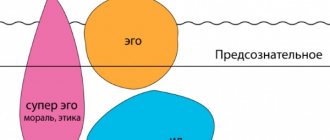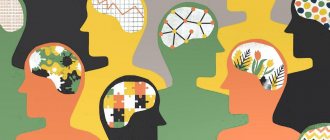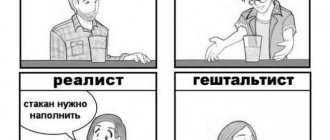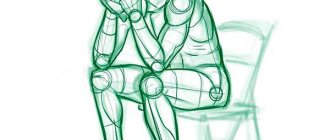Let me tell you about what an amazing, gigantic, incredible machine our brain is, which completely controls our body and our life. The author is one of those people who are fascinated by how the brain in general and the subconscious in particular work. The human subconscious is a miracle of miracles in our vast Universe. We really hope that we can convey to you a piece of this charm and draw you into the network of knowledge of the incredible wizard who is inside our heads.
The purpose of our story is to reveal to you the mechanism of the fantastic influence of the subconscious on our lives. Once you learn how this mechanism works, you can use this knowledge to make the changes you want to improve your life.
Very simple about the subconscious
You think you made a random choice, but in fact your subconscious mind made a conscious decision.
The Mentalist
- 1.Processes
- 2.Who coined the word “subconscious”?
- 3.Consciousness
- 4. Stealth
- 5.Storage
- 6.1. Genetics
- 7.2. Repetition
- 8.3. Imitation 8.1. Imitation shapes programs
- Very simple about the subconscious
- Dementia - what is this disease?
- Schizoid and Schizoid: Signs and Causes
- Paraphrenic syndrome in schizophrenia. Clinical picture
- Psychologist - what kind of specialist is this? Let's find out more
Processes
Look in the mirror.
Can you see your head? This is where an incredibly powerful machine resides - your brain. You touch your head with your hands and combs, wash it with shampoos, but do you realize that this is the main control panel of your life? But let's move directly to the subconscious. We all use the word “subconscious” very often, but do we understand what we are talking about? And understanding this in our time is already a necessity. Because when you understand this, you will immediately receive a magic wand, a flying carpet, the Frog Princess, a self-assembled tablecloth, Aladdin’s lamp and other attributes of a wizard.
Why do you need all this? To control your life! We begin!
While the conscious mind sleeps, the subconscious mind works!
Who coined the word "subconscious"?
For what? What does it mean? Where is it located? What role does it serve? How does the subconscious influence us? Now we will tell you everything!
Our subconscious and the endless stream of thoughts
The term “subconscious” was coined by French psychologist Pierre Janet more than a century ago. Let's decipher the word itself. It is immediately clear that it comes from the word “consciousness”. Pierre Janet simply added the prefix “under” to it. With the construction of the word everything is simple. But what is its meaning? Let's deal with consciousness first. The word “consciousness” comes from the verb “to know.” As you can see, this information did not help us much. We will continue to be persistent.
You can use synonyms. In many cases, synonyms help to understand the meaning of a word. As you know, synonyms are words that are the same in meaning, but different in sound and spelling. Of course, you don’t have to look for them; we’ve already written them out. Synonyms for the word “consciousness” are: mind, mind, reason, understanding.
It turns out that the “subconscious” is what is “under” the mind, “under” the mind, “under” the intellect and “under” the understanding. Yes, we are even more confused. Okay, let's try to find the meaning of the word in explanatory dictionaries. Well, of course, we have already done that. You just have to believe that there were a lot of formulations. But there was one simple one that we liked the most: consciousness is the ability to think and reason. Simple, easy, understandable. But did it become clearer to you what the subconscious is from this set of words? Don't be shy, answer directly.
Yes, something is not very clear, so we will carefully understand further...
So let's continue. Consciousness and subconsciousness are processes! Yes! This is a gigantic number of biochemical reactions and electrical impulses that occur with the help of brain cells. And such cells are called “neurons”. Scientists have counted 100 billion of these cells! Is this a lot or a little? Unfortunately, we do not feel the scale of such numbers. Agree that such numbers are empty words for us. Let's try to imagine it by comparison with something more understandable to us.
Scientists claim that if you stretch all the neurons and all the thin wires that connect them into one line, then the length of such a wire will be 1 million kilometers. But since this number doesn’t mean anything special to you and me, we thought and decided to make it more visual. To do this, we performed a couple of calculations. And this is what happened. If you fly a Boeing over a distance of 1 million kilometers at a normal speed of 945 km per hour, you will have to spend 1058 hours in the air, which is 44 days! At the same time, please note, no landings!
Such a long chain of neurons with processes is laid out in our head. This complex mechanism works without stopping for a second, producing a huge number of biochemical reactions and electrical impulses in brain cells.
The electrical impulses and biochemical processes themselves are absolutely invisible to us, we don’t even feel them, but as an effect from these reactions and electrical impulses we have very real thoughts, words, decisions, actions, emotions. Nature hardly thought of dividing our brain into consciousness and subconsciousness, creating it along a long evolutionary path. For nature, our brain is a single system. And for our body too. But scientists still divided the processes conditionally into consciousness and subconsciousness.
Why? Because numerous observations of human behavior and psyche led to the conclusion that all processes can be divided into two groups. So, in the first category were those mental processes that we can control. These are "conscious processes." Accordingly, the second group includes all mental processes that are not controlled by us. And they were called "subconscious processes."
How to read people's thoughts by their body movements
Kinds
Varieties:
- Unconscious attitudes. Standard reactions of the body to irritants. This could be a loud cry when frightened, or a jump when there is danger. They appear unconsciously and are practically not controlled by the body.
- Pathological phenomena that manifest themselves in the psyche. These include mental illnesses, painful conditions that are accompanied by hallucinations and delusions.
- Accompanying actions. One example is watching a person perform a series of tasks, or humming the same tune while performing different actions.
- Habitual actions. They are carried out without orders or unnecessary thoughts. This applies to basic actions. For example, purse your lips, gesticulate when talking, close your eyes. They are conscious, but appear unconsciously.
Consciousness
Light on the way to your subconscious
In the flow of information, it is easy to get away from the essence of any issue. Therefore, let us remember what the main goal of our research is. And the main goal is to gain a clear understanding of what the subconscious is.
For what?
- Firstly, to dispel the mysterious and mysterious fog that, whatever one may say, hovers over the word “subconscious”.
- Secondly, to better understand what this mysterious word means, which is referred to in smart books, the famous film “The Secret” and all personal development teachers.
- Thirdly, learn how to use the power of the subconscious to realize your goals and desires in order to become the master of your thinking, and, therefore, the master of your life.
So, we continue to move forward for knowledge about the subconscious.
In our opinion, it is easier to understand what the subconscious is if we compare it with consciousness. Therefore, let us first consider what processes consciousness performs. Let's take a simple task - make a to-do list for the next day. Let's consider what processes are taking place. What do you usually do for this? You probably go through something like this: you remember what you need to do, then you write down a to-do list, then you put things in some order using your principle of priorities.
During planning, our brain works completely under our control and we guide the entire process in such a task. Do you agree? This is an example of a conscious process. Consciousness is your assistant when making plans.
Recall that at the beginning of the article we defined that consciousness is the ability to think and reason. As you can see, there is a lot of thought and reasoning involved throughout the planning process. This means that consciousness is at work when performing this task. At the same time, you consciously perform every action.
Conscious action is the result of a real thought process that we ourselves start and stop.
In a conscious process, you seem to press invisible buttons. We pressed the “play” button and the process began. Pressed the “stop” button – the process stopped. What does this mean? The fact that you control this process.
For example, you are learning English. What are you doing? You memorize words, translate texts, listen to English speech - you perform all these actions in your brain consciously. Or let's say you are creating a house project. For this task, you use many functions of the mind: imagination, logical thinking, design thinking, mathematical calculations.
Consciousness also helps you create your goals. And then helps make plans for achieving these goals. Consciousness comes up with your dreams and helps you form mental images of your desires.
When you read news on the Internet, communicate on social networks, smell, distinguish colors, watch TV, solve a mathematical problem, plan a vacation date, make a decision, observe the totality of objects around you every minute, reason logically, design, construct, draw, play sports, cook delicious food, select the necessary information, think, express your opinion, try to understand something, learn, then you do this with the help of processes that occur in the mind.
Consciousness helps us see, feel, decide, read, write, set goals, make plans, think logically, make decisions, achieve goals.
Now please pay closer attention, there will be an important thought. When we perform the listed actions, we really understand what we are doing. Therefore, a distinctive feature of consciousness is that we feel, realize, and understand all the processes occurring in our consciousness.
For example, when we think about something, we are able to direct our thoughts in a specific logical way. If at the same time we decide to change the logical chain of reasoning, then we simply take it and change it. We can change our train of thought at any second. Do you agree?
How do you do it? You do this consciously because you really feel the flow of your thoughts. If you are deciding which movie to watch, which book to read, what color dress to choose, where to go on vacation, then in all these situations you really feel the process of thinking.
Where there is consciousness, there are processes that you are actually aware of. Moreover, you control them. If you want to eat, eat. If you want to sleep, sleep. If you want to read, read. If you want to decide, you decide. If you want to travel, travel. If you want to dance, you dance. And so on.
Your consciousness is working all the time while you are awake. But as soon as you fall asleep, it turns off. Consciousness rests with you. We can control consciousness. This means that we can start and stop conscious processes ourselves.
The work of consciousness is an open flow of thoughts, words, decisions, mental images, which we actually feel and sense. We can even write down our reasoning. When we understand what we are doing, our consciousness works. Awareness and meaningfulness are the two main words to describe consciousness. Consciousness works when we are awake and turns off during sleep.
And one more important detail: consciousness has been discovered only in humans. Only a person plans, builds, adds, multiplies, divides, reads, writes, invents, etc. Although it would be quite surprising to meet a dog who plans his day next to his owner.
The evolution of nature on our planet has created a fantastic structure in the form of the human brain. Using our brains, we built airplanes and now fly around the world in a matter of hours. They built huge cities, created computers, the Internet, GPS, mobile phones with computer functions, e-books, sms, social networks, email, bank cards... This list is endless. What a huge number of conscious processes were involved in creating all this!
So, consciousness is an open process, because we really feel the flow of our thoughts and reasoning. We can control consciousness. Consciousness is momentary processes occurring here and now.
Human social activity is associated with increased life satisfaction
Connection with the conscious
A simple way to consider the connection between the unconscious and consciousness is to study the phenomenon of dreams. Sleep is a special type of activity. During sleep a person:
- Moving.
- Pronounces individual words or sentences. He says something that evokes strong emotions or something extremely important.
- Thinking.
- Saves memory.
- Wakes up at the required moment.
- He is learning. In a dream, a person is able to improve his knowledge of a foreign language.
At the same time, there are no clear transitions between the areas of the conscious and unconscious. The focus of consciousness is concentrated on what is relevant to a person. At the same time, third-party actions and phenomena go into the realm of the unconscious, since they have no significance.
Stealth
Subconscious of the future
A distinctive feature of the subconscious, on the contrary, is the secrecy of all processes. We use the word "hiddenness" to mean that we do not feel how the subconscious mind works. In the previous part of the article, we found out that when consciousness works, we feel a real flow of reasoning and thoughts. What do we feel when the subconscious is working?
Processes in the subconscious occur without our conscious control, against our will, automatically. It is this complete secrecy and invisibility of processes in the subconscious that creates a natural aura of mystery around it. However, the secrecy of all unconscious processes does not prevent the subconscious from having a powerful impact on our lives. How powerful is this impact? The answer lies in the numbers. Get ready to hear this, because the numbers are quite surprising.
So, consciousness has only 4% of the influence on our lives, and the subconscious has the remaining 96%. What do these numbers actually mean? Below we will try to understand this.
We discussed in the previous subsection that a person can stop a conscious process, for example, the process of logical thinking, and direct thoughts in a different direction. But this trick will not work with unconscious processes, because they turn on automatically, without our will, without our control.
The word “automatically” requires special attention here. It means that subconscious processes are controlled without the direct participation of a person. There is some kind of secret automation that triggers unconscious processes. But this automation is not controlled by humans in any way. Below we will talk about what triggers these processes. For now we continue.
So, we do not control unconscious processes. We don't even feel when and how they turn on and off. No one sees or feels them, but everyone talks about them. Judge for yourself, research in recent years claims that subconscious processes create 96% of everything that happens in our lives.
This figure suggests that the subconscious controls us 96%. And only 4% of our lives are managed independently, that is, consciously. It turns out that we control our consciousness, and the subconscious controls us in a hidden way. Subconscious processes are invisible, inaudible and intangible, but they create 96% of everything that happens in our destiny. It sounds ridiculous.
Let's take a normal 24-hour day, of which we are awake for 16 hours. Let's calculate what 96% of 16 hours is. We take a calculator and get 15 hours 36 minutes. It turns out that we spend only 24 minutes a day in conscious influence! The rest of the time we are at the mercy of the subconscious. This is incredible! How can this be? At the same time, there is another problem, and it lies in the fact that the powerful force of the subconscious can work in two directions: in our favor and not in ours. How can we put this fantastic force to work for our benefit? Here we are precisely looking for an answer to this question.
But first we need to prepare ourselves to perceive all further information, so we will try to better understand a number of things about the subconscious. We have a question: what word would be logical to call processes that occur without the participation of consciousness? Correct answer: unconscious! Because “unconscious” = “unconscious”.
Another question: what word is most logical to apply to processes that occur unconsciously? Correct answer: unconscious.
So, it is logical to call all processes that occur without the participation of our consciousness “unconscious” or “unconscious”. That's why scientists called them that. In general, subconscious, unconscious and unconscious are terms that can be used interchangeably.
The unconscious includes everything that cannot be controlled by the conscious mind. In other words, it is a huge storage device of information, a storage device with unlimited memory capacity.
Go ahead. Among the unconscious processes are those that we call “memory.” Because memory in the brain is not a library, it is also electrical impulses and biochemical reactions in brain cells. First of all, all programs for controlling our physical body are recorded in the memory of the subconscious.
For example, we are not aware of how blood moves through our body; how all the processes that maintain our normal body temperature occur; how the heart pumps blood; how our lungs breathe; how each cell of our kidneys and liver works. We do not control the processes of hearing, vision and smell. All this happens automatically, without our conscious participation.
The subconscious is an omnipotent giant that controls this entire huge world - our body, in which millions of chemical reactions occur every fraction of a second.
All these processes are controlled by programs that are stored in the subconscious. These programs are intangible and invisible to us. They work automatically. The subconscious invisibly controls not only the entire biology in our body, it also invisibly controls the entire psychology.
The subconscious contains programs that force us to choose certain lovers, deputies, manner of communication, books, films, color of clothing, etc. This list of programs is endless. It includes absolutely all our inclinations and habits. The subconscious stores all the programs about us as we are individually. Everyone has their own set of programs.
In general, all the programs that make up the image of our personality are stored in the subconscious. These programs determine our appearance, all our habits, style of communication with others, attitude towards ourselves and others, tastes in clothing, food, thoughts, behavior in different situations, the nature of emotions, level of self-esteem, our reactions and feelings in a variety of situations.
Whatever our programs are, that’s how we appear before the world. Therefore, do not try to change other people with persuasion and advice. And myself too. This is the most useless thing. Everything is programmed. Changes in a person's personality can only occur when other programs are installed in his subconscious.
A simple example: one person likes to do exercises, while the other doesn’t like it at all. This means that one has a positive program for exercise, while the other either does not have one at all, or has a negative attitude towards this activity. What to do to make your second one love exercise? Establish an appropriate positive program.
No matter how strange it may sound, the discovery of such hidden programming occurred thanks to plastic surgery. How? A remarkable American plastic surgeon named Maxwell Moltz discovered one strange circumstance many years ago. It shook him to the core, so much so that he quit plastic surgery and began studying the brain.
He found that even after patients had undergone significant facial plastic surgery, many saw no change when they looked at themselves in the mirror. Moltz was puzzled. He wondered how this could be? The man changed almost beyond recognition, but he himself did not see any significant change in the mirror.
This is how the discovery was made that we see the image of our personality through programs in the subconscious about ourselves. Therefore, even if you change a person’s appearance, but do not change his programs about himself, he continues to see himself as he was. Everything is programmed in us.
This is the same as taking, for example, a telephone. It looks like just a plastic case. If we change one plastic case to another, and leave the internal software the same, then we will get the same phone. Functionally, nothing will change, only the appearance of the case will change. But if we replace the software and leave the body the same, then we will get a completely different phone. So software is everything. If you change your software, you can change everything in your life.
Yes, we completely forgot to explain the meaning of the word “program”. Let's fix it. We found a very interesting description of the meaning of this word on Wikipedia. The term comes from the Greek words "pro" (meaning "before") and "gram" (meaning "record"). If we put it together, it turns out that the program means “pre-recording”, that is, “pre-recording”. This in itself is interesting.
So, a program is a preliminary description of upcoming events or actions
. Brilliant explanation! This is exactly what we need to deeply understand the meaning of programming in the subconscious. But a number of questions immediately arise: where do programs come from? Is it possible to change them? Is it possible to reprogram yourself? Fortunately, it is possible. We'll talk about this below.
Reprogramming the Subconscious
We said earlier that consciousness turns off during sleep. So, unlike the conscious mind, the subconscious mind does not rest at all. It works throughout life, seven days a week, just like the lungs, heart, liver, kidneys and all other organs do. They all work 24/7 non-stop. You are not sleeping - the subconscious is working, you are sleeping - it continues to work.
Again, a natural question arises: well, during wakefulness you can still understand why it works, but during sleep why doesn’t it rest? Because the subconscious controls all systems in the body, including synchronous work between all organs and all biochemical processes in all cells of the body, and, by the way, there are 100 trillion of them. The subconscious has no time to sleep! Because biological processes go on continuously.
To further impress you with the amount of work the subconscious mind does in our physical body, let's try to imagine what a hundred trillion cells are. Let's take a million boxes and put a million cells in each of them, and then put these boxes in a warehouse. So, we have a million boxes in our warehouse, each containing a million cells. So, to get 100 trillion cells, you need to take a hundred such warehouses!
And every cell must be managed and not a single one should be forgotten. Thanks to our subconscious that it does this on its own! What a blessing that you and I don’t even have to think about it!
Nonverbal communication in business communication
Characteristics of the theory
Now the study of the area of the unconscious occurs according to one of the theories that were developed by outstanding psychologists. The main theories belong to Lacan, Jung, Freud.
According to Freud
Sigmund Freud had his own idea about the unconscious. He attributed to this area actions in which a person is not aware. He argued that the psyche itself pushes into the realm of the unconscious secrets, fantasies, desires that contradict the moral principles of society and disturb a person too much.
According to Jung
Carl Jung contributed to the expansion of the concept. He created a separate discipline - analytical psychology, for which he developed the term “collective unconscious”. The scientist introduced significant changes if we compare his theory with psychoanalysis.
Jung divided the unconscious into two layers:
- Personal - he referred to it as individual mental processes.
- Collective - processes affecting a group of people.
The group unconscious is a collection of static forms (dominants or archetypes). Initially they are innate, but over time they can be updated.
According to Lacan
The next assumption regarding the unconscious was made by the French psychoanalyst Jacques Lacan. He suggested that the area of the unconscious is constructed as speech, but one cannot accept Lacan's assumption that the unconscious is a language, since this is a kind of metaphor. Its decoding - the unconscious is similar to language, as it works on similar rules. However, it cannot be exhausted by the laws of linguistics.
Storage
Our world is filled with what we do not feel or see.
Here is a simple example: many times you have sent an SMS from your phone, but of course you have never seen how the message “flies” from the phone. You have received text messages many times, but you have never seen them “fly” into your mobile phone. Are they invisible? Real magic! Your phone doesn't even have a cord. So what flies away from it? And what arrives on another mobile phone? This is an invisible electromagnetic wave that travels fantastically quickly through walls, closed windows and doors of apartments, offices, cars, trains, and supermarkets. This is a wave that reaches both America and Australia in 2.5 seconds. We don't see or feel it, but, fortunately, the device on the phone somehow recognizes the wave.
And another simple example: when we talk to a person nearby, we do not see or feel the sound wave that our voice creates. But our ears perceive this wave perfectly, so we hear each other.
Let's continue our journey into the world of the subconscious. Among other things, the subconscious is also a huge repository of information about our lives. In the literal sense of the word, everything that happens to us is stored in the subconscious every second. The subconscious is the story of our life, which is always with us. It's as if we have a built-in video camera that records a movie of our life. But this camera is very advanced, since it captures not only the picture, but also smells, emotions, and taste.
Of all the information stored in our subconscious, there is one very important part that is of great interest to you and me. This part of the information is recorded in the subconscious in the early period of our life, that is, in childhood. What happened to us in childhood? We lived with our parents or in an environment that replaced our parents. These people were with us a lot of time. How could it be otherwise!
The lives of the people around us were happening before our eyes. We heard what and how they talked. We witnessed various events that happened in our childhood. It was our environment that gave us a vision of the world, that is, a worldview. Each person sees a different picture of the world because he sees it through the programs he has formed.
If you lived surrounded by people who were kind to you and were happy themselves, then there is a good chance that to this day the picture of the world that you see is the same. But if someone lived surrounded by people who grumbled, showed constant dissatisfaction, and constantly discussed the negative aspects of events, then it is unlikely that an adult child, leaving such an environment, will see the world in bright colors of happiness and joy.
Scientists claim that it was during childhood that we acquired the most important programs, which to this day are stored in the subconscious and secretly control us throughout our lives. Programs are stored in the subconscious, but in reality their influence is manifested in the form of inclinations, habits, ways of thinking, behavior patterns, principles, rules to which we comply, beliefs, manner of speech, diction, gestures, etc.
How did we manage to pick up these programs in childhood? We had three ways to do this: genetics, repetition and imitation. If you have already left childhood, then these three methods have successfully formed the main set of those hidden programs that control 96% of you.
Why do we need lie calibration: we figure out a liar on the fly!
Now let's look at all three methods in order:
The role of the subconscious in human life
Some people believe that all actions they perform are under the control of the mind. However, in fact, the human subconscious is what completely controls our lives. Moreover, his goals may be radically different from our own. For example, if a person constantly thinks about what he is afraid of, these thoughts are deposited on a subconscious level. As a result, fears can materialize, although we, on the contrary, would not want this to happen. Thus, most of our illnesses and failures occur due to incorrect attitudes at the subconscious level. To become a happy person, you need to learn to think correctly.
The subconscious is a huge repository of data and all the information we have accumulated throughout life. Even events from early childhood can be reproduced with maximum accuracy in a state of hypnosis. The ability to remember absolutely everything and retain it for an unlimited time is one of the main functions of the subconscious.
The huge role of the subconscious in maintaining our mental balance. A person, as a rule, begins to experience unpleasant sensations when leaving his comfort zone. In this way, our subconscious tries to protect us from the unpleasant consequences of rash and risky actions.
Repetition
This amazing way of programming plays a fantastic role in our lives.
Because most of the programs that we received in childhood were formed by simple and unpretentious repetition of the same thing. How did this happen? Our parents and our other loved ones very often repeated certain words in our presence or even especially for us. These phrases formed neural circuits in our brain. So repetitive information turned into programs for us. Go out to the playground on a sunny day. On such a day, there are usually many mothers walking with their children. You will hear many programs that a mother repeats to her child during a walk every day.
Why is repetition so important to us? Because the subconscious has a very interesting reaction to repeated information. If you press and press the “repeat” button, the information will be heard over and over again. During repetitions, a chain of neurons is formed in the brain. It becomes thicker and thicker from repetition to repetition - this is how a program is formed. This is a scientific fact. Our brains are just designed that way by nature.
Any repeated information builds neural chains in the brain and becomes a program for us. This feature was formed in the process of evolution of living nature. Teaching a person anything is built on this feature. All learning involves repetition of information and experience.
We would like to surprise you: not only humans have this feature. It can be observed everywhere in wildlife. Look at your pets. For example, raising cats and dogs is also based on the principle of repeated repetition of commands, which over time are built into the pet’s brain and then carried out on their own.
And we repeat again (we don’t even hide the fact that we do this deliberately): all the phrases and words that your parents repeated to you as a child are stored in your subconscious. It is these phrases and words that have turned into programs that now control you and your life. But it's not just about repeating words. Repeated situations play the same role. They also create programs.
We want to tell you one programming example where repeating situations create programs. This story is not even about a person, but about dogs. A very interesting incident was told to us by a friend. One day early in the morning he was jogging on the outskirts of the city. And suddenly the dogs started running after him. They barked at him and tried to catch him and bite him. As he ran, more and more animals gathered. The acquaintance did not know what to do. He said that he was very scared. The dogs chased him, and the pack grew larger. Everything indicated that the animals were ready for any aggression.
And he just accidentally started running chaotically, intuitively rushing from side to side, not knowing what to do. And so by chance he ran out from the sidewalk onto a road on which there was not a single car. And a miracle happened: the dogs ran along the road, but not one of them ran out onto it. So he realized that they were afraid of the road.
Imagine: there were absolutely no cars on the road, but not a single dog dared to run out there. So the acquaintance ran along the road to the crossroads, and there he crossed the road, and the animals generally lagged behind him.
You probably understand why this happened. Many dogs, in the course of life experience, starting from puppyhood, have developed a program that the road is a dangerous place, so you should not run out onto it.
Dogs have an emotional brain, meaning these animals experience emotions, including the emotion of fear. Thus, the repeated experience of fear that the dog had at an early age, when it ran out onto the road and cars were driving along it, formed a neural chain. The chain is activated automatically when the dog approaches the road.
Such incredible thoughts are wandering through my head that even my subconscious is blushing. Janusz Leon Wisniewski. Loneliness on the Internet
Conscious and unconscious in the psyche
Automatic (unconscious) and controlled (conscious) behavior complement each other, but sometimes they can conflict. A car is driving towards you, you jump away from it without thinking, but with all your desire to punch the driver in the face, you have to restrain yourself from doing so. There is more automatic behavior in our world than we think. Seeing a waitress in a restaurant, we know how she and I will behave. But we don't even think about it, we just know... This unconscious perception sets expectations in our head regarding the behavior of another person, based only on a very small amount of information. Thus, we instantly form expectations and assumptions based on social status, etc.
Most of what we do is a knee-jerk reaction. The stronger the unconscious, the more effort must be made to consciously change the situation. For example: if you are in a bad mood, do not lash out at the first person you meet or burst into tears in an inappropriate place. It is very important to understand what the unconscious is, otherwise you can drown in your impulses, which are very difficult to understand and even more difficult to control. To live according to your plan, you need to understand and control your unconscious, or at least find a compromise with it.
Imitation
This is a normal developmental stage for a human child.
Imitation is behavior that a child observes and then reproduces. Moreover, there is nothing offensive in the word “imitation” in this situation. In living nature, imitation is considered a progressive phenomenon because it allows information to be transferred from one living organism to another without the need for genetic inheritance. Imitation is characteristic only of developed living beings. For example, dolphins have this ability. In particular, with the help of it they learn to hunt. Macaques also have the ability to imitate. It was noticed that Japanese monkeys began to wash potatoes when they saw how a person did it.
The brains of less evolved creatures, such as reptiles, do not have the specialized neurons needed to perform the function of imitation. Therefore, you can wash the potatoes in front of the turtle as much as you like, it still won’t do it. We are able to imitate movements, actions, skills, behavior, gestures, facial expressions, voice, sounds, speech, etc. Many succeed in this, and not only in childhood.
We have the ability to imitate thanks to certain neurons called “mirror” neurons. Why mirrored? Because to imitate is to do something according to some model, that is, the ability to look at someone and repeat movements as if you were the reflection in the mirror.
The mirror neuron system allows a person to observe and then recreate the actions of others. Human babies are able to imitate facial expressions as early as 36 hours after birth. They are able to imitate a smile, a frown, a wide open mouth and eyes.
Imitation plays an important role in how a baby perceives the world. The child learns to understand the world around him through imitation. As a person grows, he learns more and more, imitates more and more. Parents need to be careful and careful about what they do in front of their children.
Fate is not something predetermined, but a conscious choice to which our subconscious pushes.
Imitation shapes programs
If a child grows up in an atmosphere of love and joy, then it is precisely this atmosphere that becomes the normal picture of the world for his adult life.
He will strive for such an atmosphere, he will create it himself. If a child observes slander, then this too will become a normal picture of the world for the child. It is precisely this atmosphere that he will strive for in adulthood and will shape it himself. Pay attention to whether the information around you is useful, positive or negative. This information can be conversations with friends and girlfriends, advertising, repeated images, the same pop-up thoughts. Remember, maybe a friend tells you every day about her unsuccessful relationships or illnesses. There is dual programming going on here. The friend programs herself and grabs you.
Perhaps you like to watch films about unhappy love. Keep in mind that this is programming you too. Most likely, this programming affects your relationships in real life, and the relationship leaves much to be desired.
Analyze what you constantly say to your children and other people you care about. If you say: “You are a real genius,” then this is good programming. But if you say: “You never succeed in anything,” then correct yourself immediately. Set good programs for yourself and people!
Milyukova Yuno Jul 11, 2020
Levels
Levels:
- Consciousness. It is called the top layer of the psyche, the leading edge, the “tip of the spear.” This is where the interaction of the psyche with the outside world begins. Consciousness can be divided into 2 parts. The main one through which the main information passes is focus. This part is surrounded by the periphery.
- Preconscious. Psychologists call this layer the “service area.” Its main function is to protect consciousness from overload. The preconscious contains impressions that a person cannot be aware of, but is able to turn to them at the necessary moments. The preconscious region contains all irrelevant experience.
- Repressed unconscious. This level contains components of the psyche that were previously classified as conscious, but were gradually repressed. One of the main reasons why certain components of the psyche are transferred is a painful experience for the individual. Since the psyche cannot painlessly integrate it into the usual consciousness, it displaces it.
- The fundamentally unconscious unconscious. It is a deep layer of mental phenomena. It is closest to biological, psychophysiological processes in the body. This layer contains mental phenomena that could never be conscious and will not be conscious in the future. Examples include instincts and reflexes.











